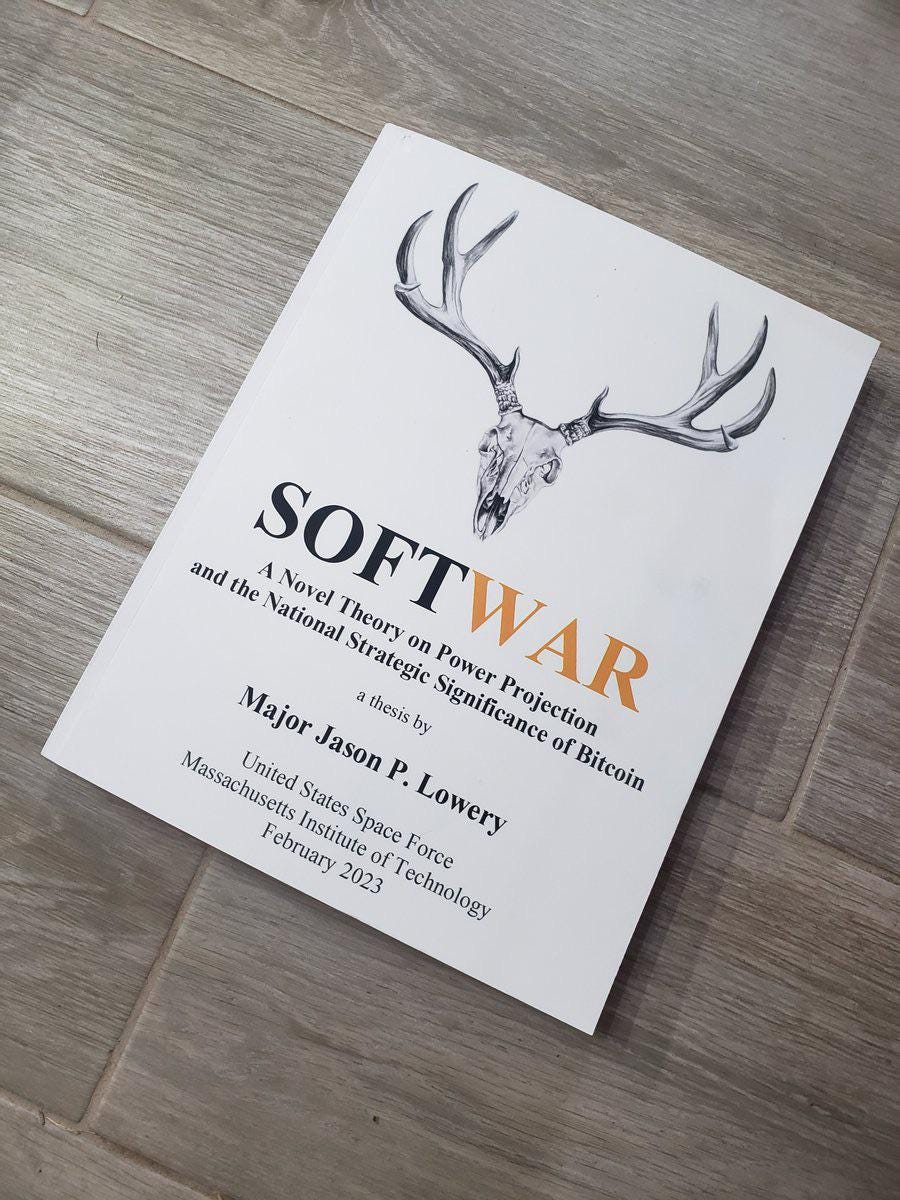Bitcoin & Defense
Bitcoin is not just a currency, it is also a cyber war-fighting technology that will be key to a world with less, not more, digital warfare.
SoftWar via Software
Russia vs. Ukraine, Hamas vs. Israel, China vs. Taiwan… the specter of war is looming large in the cultural landscape at the moment, fueled by both real and fictional portrayals of cyber attacks. The World Economic Forum has been sounding the alarm on the likelihood of increased cyber attacks and President Obama just made a movie about a cyber attack that cripples the American empire.
That last point feels, um… notable.
Silicon Valley, overindexed on software and increasingly out of touch, spent the past decade coding $40 burrito delivery apps & augmented reality mustache emojis. But in the past 24 months since the reality of war made its reappearance, the need for advanced hardware technologies became clear and funding has started pouring in for companies in the DeepTech, DefenseTech, & manufacturing sectors. Anduril, Palantir, Hadrian, Boom Supersonic, Loft Orbital, SpaceX, and Starlink are a few examples of a growing focus on hardware and a rising sense of our technological insecurity.
Let’s get physical…
And at the same time war is going digital, the digital world is getting physical. In the blockchain field, there has also been a renewed focus on bridging the online & offline worlds with the DePIN (physical infrastructure) and RWA (real world assets) sectors gaining the most attention.
Bitcoin, a *digital* currency secured by *physical* hardware, has always embodied this convergence but may prove to be much more important now…
(Cyber)Space Race
Major Jason Lowery is a U.S. Space Force Officer & Astronautical Engineer whose 408-page M.I.T. thesis focused on the national security importance of Bitcoin.
“Softwar: A Novel Theory on Power Projection and the National Strategic Significance of Bitcoin”.
His basic claim is that Bitcoin can be used as a non-lethal form of power projection to mitigate the risk of cyberwarfare by protecting valuable assets in an increasingly digital world.
Tanks secure Land Space. Ships secure Sea Space. Planes secure Air Space. Rockets secure Outer Space. We need something to secure Cyber Space.
The way we secure valuable resources in every domain is by increasing the physical costs of attacking or stealing them. A farmer builds a fence around his crops, a company hires armed security, a nation secures their gold in a vault.
To secure any resource you must figure out how to impose a high physical cost to attacking it.
But how can you do this in a nonphysical domain like cyberspace? It turns out this question matters a lot as all our most valuable assets increasingly exist in cyberspace. Financial records, sensitive personal data, medical history, family photo albums, etc.
So how can you impose a high physical cost on a digital attack?
Well thanks to our boy Turing (and Gödel’s Incompleteness Theorems) we know that using something digital (like code) to secure something digital is impossible. So just like in every other domain, the digital world must also be secured by imposing a high physical cost.
Enter Bitcoin.
Bitcoin secures the world of bits by tapping into the world of atoms.
World Computer
Bitcoin is the largest computer on Earth. In fact, it is a computer exactly the size of Earth. Only, it’s powered not by a tiny microchip, but by a gigantic, planet-sized macrochip known as the global electric power grid.
The M2 chip in your MacBook Air and the global energy grid are both just electricity passing through a circuit of wires at the end of the day.
“From a computer science perspective it’d be really easy to convert the global electric power grid into a giant physically expensive to operate computer.
All you would have to do is apply Boolean logic to the power and build some kind of converter to convert watts into bits of information that can pass across the internet. And guess what? That converter is already built, it’s already been adopted, it’s already scaled globally.
That technology is called Bitcoin.”
— USSF Major Jason Lowery, 2023
Bitcoin Proof-of-Work converts real world physical energy into bits. Meaning that attackers (well, their computers anyway) are physically constrained by the amount of energy they need in order to attempt an attack on the network.
It would take an incredible amount of expensive, and impossible-to-fake energy in order to steal from or attack the digital network. And if the enemy is successful, they will have spent more money than they’ll net from the attack.
It would be more profitable to instead use that same amount of money, electricity, and ASIC chips to help secure the network and earn BTC in return…
“Bitcoin has achieved a level of computing that no one can overthrow it through computation alone. The effort to do so would require a massive covert operation of chip fabrication, then a coordinated assault that would give them dominance over the next block for 10 minutes until we rework the protocol around them.
They would have lost [$20 billion] dollars and all they got to do was one double spend.
Now here's the thing, long before we get to that point, they figure out that if they just let [their machines] run, they can actually get some Bitcoin as a reward.”
— Andreas Antonopoulos, 2014
By tying digital bits to real world physical power from the energy grid, the Bitcoin network imposes a huge physically prohibitive cost of attack on our most valuable digital assets. This includes not just our digital money, but also our digital files, photos, music, data, nuclear launch codes, and other high value digital assets.
Conclusion
In every realm, physically prohibitive costs create security by disincentivizing attacks before they happen. To defend the world of bits, one needs to impose a physically prohibitive cost on the control of bits.
Bitcoin as a technology does just that. It physically secures cyberspace by imposing an impossibly high physical cost which reduces the profitability of attacking our most valuable digital assets. Potentially eliminating this type of warfare altogether.
We are at the dawn of a new age of digital power projection as humanity expands its footprint in the digital world, and it is critical that nations physically protect their cyberspace as well as they physically protect their other domains.
Bitcoin is not just a currency, it is also a cyber war-fighting technology that will be key to a world with less, not more, cyber warfare.
What We’re Reading
State of DePIN (EV3)
Softwar: A Novel Theory on Power Projection and the National Strategic significance of Bitcoin (Lowery)
About M31 Capital
M31 Capital is a global investment firm dedicated to cryptoassets and blockchain technologies that support individual sovereignty.
Website: https://www.m31.capital/
Twitter: https://twitter.com/M31Capital







